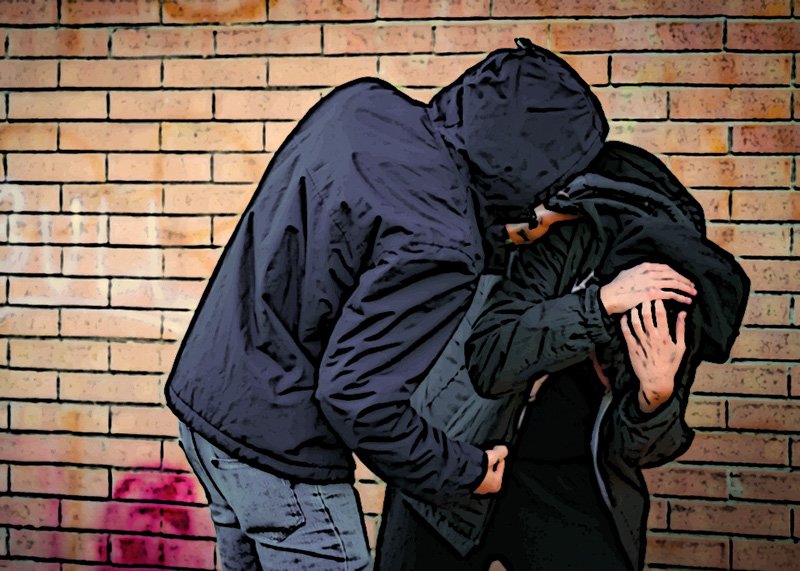ARS § 13-2904 is the Arizona statute that defines the crime of disorderly conduct. People commit this offense when they knowingly engage in a certain type of disruptive behavior (like making loud noise or using offensive language) and do so with the intent to disturb the peace or the quiet of a neighborhood, family, or a person.
Most violations are Class 1 misdemeanors punishable by six months of jail time.
The language of ARS 13-2904 states that:
A person commits disorderly conduct if, with intent to disturb the peace or quiet of a neighborhood, family or person, or with knowledge of doing so, such person:
- Engages in fighting, violent or seriously disruptive behavior; or
- Makes unreasonable noise; or
- Uses abusive or offensive language or gestures…; or
- Makes any protracted commotion…with the intent to prevent the transaction…of a lawful meeting…; or
- Refuses to obey a lawful order to disperse…; or
- Recklessly handles, displays or discharges a deadly weapon or dangerous instrument.
Examples
- challenging a guy to a fight at a concert.
- playing excessively loud music in an apartment.
- refusing a police officer’s order to stay away from a hazardous substance.
Defenses
Persons facing disorderly conduct charges have the right to contest them with a legal defense. A few common defenses include defendants showing that:
- they did not commit an act listed in ARS 13-2904,
- they did not act with an intent to disturb the peace, and/or
- law enforcement did not have probable cause for an arrest.
Penalties
Most violations of ARS 13-2904 are Class 1 misdemeanors (as opposed to a Class 1 felony).
The crime is punishable by:
- custody in jail for up to six months, and/or
- a maximum fine of $2,500.
In this article, our defense attorneys will discuss what the law is under this statute, defenses available if charged, the penalties for a conviction, and related crimes.

ARS 13-2904 is the Arizona statute that defines the crime of disorderly conduct. People commit this offense when they knowingly engage in a certain type of disruptive behavior.
1. How does Arizona law define “disorderly conduct”?
People are guilty of disorderly conduct in Arizona if they knowingly commit an act listed within ARS 13-2904 and do so with the intent to disturb the peace or quiet of a neighborhood, family, or person.
A person commits a prohibited act under this law when he/she:
- engages in fighting, violent or seriously disruptive behavior,i
- makes unreasonable noise,ii
- uses abusive or offensive language or gestures in a manner likely to provoke immediate physical retaliation,iii
- makes any protracted commotion, utterance or display with the intent to prevent the transaction of a lawful meeting,
- refuses to obey a lawful order to disperse issued to maintain public safety in dangerous proximity to a fire, a hazard, or any other emergency, or
- recklessly handles, displays, or discharges a deadly weapon or dangerous instrument.iv
Note that if a defendant commits a single act of disorderly conduct against multiple persons, then he/she can be charged with respects to each person he/she committed the act against.v
2. What are the best defenses to ARS 13-2904?
Criminal defense lawyers draw upon several legal strategies to defend against charges in disorderly conduct cases. Three common defenses include defendants showing that they:
- did not commit an act listed in the statute.
- did not act with an intent to disturb the peace.
- were arrested without probable cause.
2.1 No prohibited act
People are only guilty of disorderly conduct if they commit an act specifically listed under ARS 13-2904 (for example, making unreasonable noise). A defense, then, is for an accused to show that he/she did not commit a prohibited act.
2.2 No intent to disturb the peace
Recall that defendants must act with an intent to disturb the peace to be guilty of criminal charges under this statute. It is always a defense, therefore, for an accused to show that he/she did not act with this purpose.
2.3 No probable cause
The Fourth Amendment to the U.S. Constitution says that police officers must have probable cause before they can detain or arrest a suspect of a crime.
If a person was stopped or arrested for violating this law, and there was no probable cause, then any evidence obtained following the improper stop/arrest could get excluded from the case. This can result in the dismissal of the charges and could keep an accused’s criminal record clear.

A violation of this statute can result in a fine and/or a prison sentence.
3. What are the penalties for disorderly conduct?
If a person commits this crime by recklessly handling or discharging a deadly weapon, the offense is charged as a Class 6 felony.vi
All other disorderly conduct offenses are charged as Class 1 misdemeanors.vii
A first-time felony conviction of felony disorderly conduct is punishable by up to a two-year state prison sentence.
A first offense of misdemeanor disorderly conduct is punishable by:
- custody in jail for up to six months, and/or
- a maximum fine of $2,500.
Note that a judge has the authority to impose three years probation in lieu of jail time.
4. Are there related offenses?
There are three crimes related to disorderly conduct. These are:
- assault – ARS 13-1203,
- criminal damage – ARS 13-1602, and
- public consumption of alcohol – ARS 4-244(20).
4.1 Assault – ARS 13-1203
ARS 13-1203 is the Arizona statute that says a person commits the crime of assault if he/she:
- intentionally or recklessly causes physical injury to someone,
- intentionally places another person in fear of physical injury, or
- knowingly touches someone with the intent to injure or provoke them.
Unlike with disorderly conduct, simple assault is always charged as a misdemeanor.
4.2 Criminal damage – ARS 13-1602
ARS 13-1602 is the Arizona statute that says it is a crime to recklessly commit certain acts, like:
- defacing another person’s property, or
- tampering with another person’s property so that its value or function is substantially impaired.
Unlike most disorderly conduct cases, criminal damage cases pertain to acts involving another person’s property.
4.3 Public consumption of alcohol – ARS 4-244(20)
ARS 4-244(20) is the Arizona statute that makes it a crime for a person to consume spirituous liquor in a public place, thoroughfare, or gathering.
Note that if a person drinks in public and then drives while intoxicated, he/she is guilty of both:
- public consumption of alcohol, and
Note, too, that if a person drinks in public and then commits a prohibited act under ARS 13-2904, he/she is guilty of both:
- public consumption of alcohol, and
- disorderly conduct.
Legal References:
- See, for example, Prosise v. Kottke, 466 P.3d 386 (2020).
- See, for example, Henderson v. Mohave County, 54 F.3d 592 (1995).
- See, for example, In re Julio L., 197 Ariz. 1 (2000).
- Arizona Revised Statutes 13-2904. As to the discharge of a deadly weapon, see State v. Williams, 236 Ariz. 600 (2015).
- State v. Burdick, 211 Ariz. 583 (2005).
- A.R.S. 13-2904B.
- See same.
